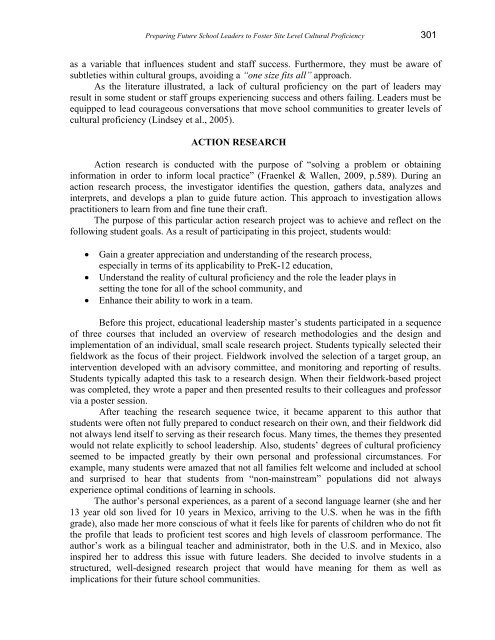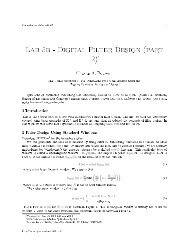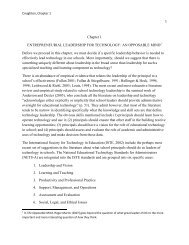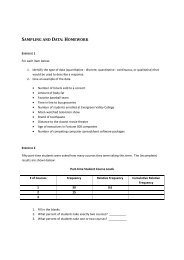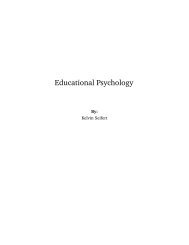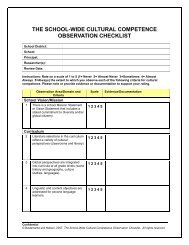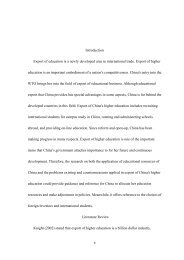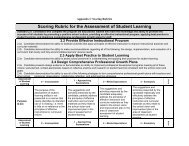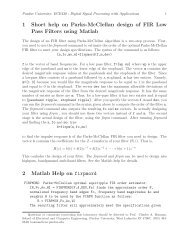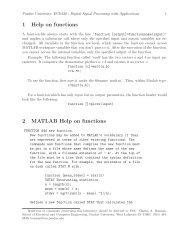Blazing New Trails - Connexions
Blazing New Trails - Connexions
Blazing New Trails - Connexions
You also want an ePaper? Increase the reach of your titles
YUMPU automatically turns print PDFs into web optimized ePapers that Google loves.
Preparing Future School Leaders to Foster Site Level Cultural Proficiency 301<br />
as a variable that influences student and staff success. Furthermore, they must be aware of<br />
subtleties within cultural groups, avoiding a “one size fits all” approach.<br />
As the literature illustrated, a lack of cultural proficiency on the part of leaders may<br />
result in some student or staff groups experiencing success and others failing. Leaders must be<br />
equipped to lead courageous conversations that move school communities to greater levels of<br />
cultural proficiency (Lindsey et al., 2005).<br />
ACTION RESEARCH<br />
Action research is conducted with the purpose of “solving a problem or obtaining<br />
information in order to inform local practice” (Fraenkel & Wallen, 2009, p.589). During an<br />
action research process, the investigator identifies the question, gathers data, analyzes and<br />
interprets, and develops a plan to guide future action. This approach to investigation allows<br />
practitioners to learn from and fine tune their craft.<br />
The purpose of this particular action research project was to achieve and reflect on the<br />
following student goals. As a result of participating in this project, students would:<br />
Gain a greater appreciation and understanding of the research process,<br />
especially in terms of its applicability to PreK-12 education,<br />
Understand the reality of cultural proficiency and the role the leader plays in<br />
setting the tone for all of the school community, and<br />
Enhance their ability to work in a team.<br />
Before this project, educational leadership master’s students participated in a sequence<br />
of three courses that included an overview of research methodologies and the design and<br />
implementation of an individual, small scale research project. Students typically selected their<br />
fieldwork as the focus of their project. Fieldwork involved the selection of a target group, an<br />
intervention developed with an advisory committee, and monitoring and reporting of results.<br />
Students typically adapted this task to a research design. When their fieldwork-based project<br />
was completed, they wrote a paper and then presented results to their colleagues and professor<br />
via a poster session.<br />
After teaching the research sequence twice, it became apparent to this author that<br />
students were often not fully prepared to conduct research on their own, and their fieldwork did<br />
not always lend itself to serving as their research focus. Many times, the themes they presented<br />
would not relate explicitly to school leadership. Also, students’ degrees of cultural proficiency<br />
seemed to be impacted greatly by their own personal and professional circumstances. For<br />
example, many students were amazed that not all families felt welcome and included at school<br />
and surprised to hear that students from “non-mainstream” populations did not always<br />
experience optimal conditions of learning in schools.<br />
The author’s personal experiences, as a parent of a second language learner (she and her<br />
13 year old son lived for 10 years in Mexico, arriving to the U.S. when he was in the fifth<br />
grade), also made her more conscious of what it feels like for parents of children who do not fit<br />
the profile that leads to proficient test scores and high levels of classroom performance. The<br />
author’s work as a bilingual teacher and administrator, both in the U.S. and in Mexico, also<br />
inspired her to address this issue with future leaders. She decided to involve students in a<br />
structured, well-designed research project that would have meaning for them as well as<br />
implications for their future school communities.


